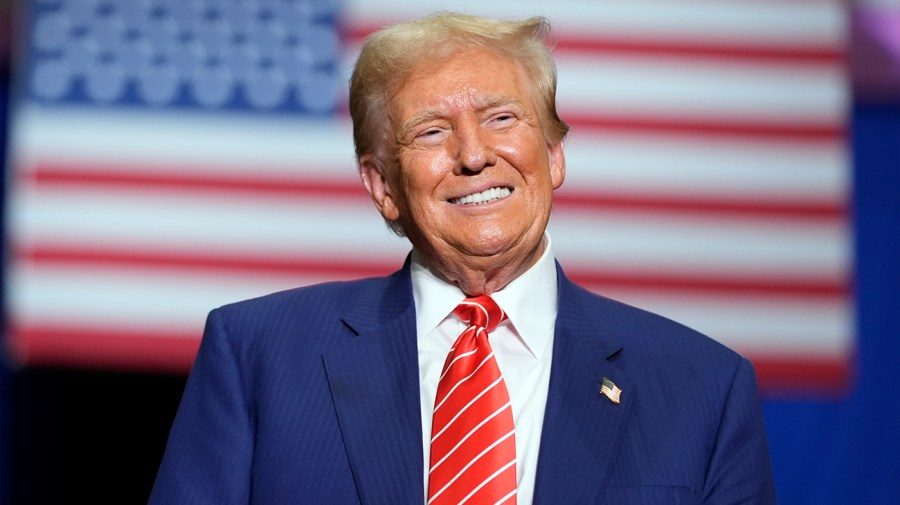Former President Trump is twisting himself into knots on abortion as he tries to navigate an issue that has proven galvanizing for Democrats and politically fraught for his own party ahead of November.
Trump has repeatedly urged Republicans to prioritize winning elections, even if it means softening their position on abortion. But his approach risks alienating social conservatives without the benefit of winning over more moderate voters.
“The advice we’ve always given to clients on this issue is do not stand in the middle of the road, because you’ll get hit by traffic going both ways,” said Chuck Coughlin, an Arizona-based GOP consultant.
Trump last week made a slew of statements on reproductive issues that were all over the map politically.
He argued Florida’s ban on abortion after six weeks of pregnancy was too strict and claimed on social media his administration would be “great for women and their reproductive rights.” He later said he would vote no on a referendum that would overturn the Florida law and protect abortion access.
Trump also vowed the government would cover the cost of in vitro fertilization (IVF) treatments if he is elected, an announcement that seemed to catch some in the party off guard, even as he has bragged about ending Roe v. Wade, the same decision that has cast uncertainty around IVF access.
Lila Rose, a prominent anti-abortion activist, has argued Trump’s positions on reproductive rights run counter to how he governed during his first term. She cited his criticism of certain state-level abortion bans as too strict, changes to the GOP platform on abortion and his support for taxpayer-funded IVF.
“This has killed the enthusiasm of Trump’s own base,” Rose posted on the social platform X, urging Trump to change course and take advantage of the momentum among conservatives from his opposition to the Florida ballot measure.
The Trump campaign and its allies have been adamant that the former president has a strong record to appeal to anti-abortion activists and social conservatives.
“President Trump is pro-parents, pro-babies, and pro-family and his strong pro-life policies reflect that. His support for protecting and expanding IVF coverage for families should be applauded by the pro-life community as it will further promote the culture of life,” Rep. Elise Stefanik (R-N.Y.), chair of the House GOP conference, said in a statement provided by the Trump campaign.
Trump has tried to walk a tightrope on abortion ever since the Supreme Court overturned Roe v. Wade in June 2022.
The former president has taken credit for ending Roe through his appointment of conservative justices, arguing the issue of abortion should be left to the states and calling it a “beautiful thing to watch” as a patchwork of restrictions takes place. He’s spoken in support of exceptions for rape, incest and instances where a mother’s life is at risk.
While saying he wouldn’t sign a national abortion ban, he declined to say he would veto such a ban if it made it to his desk. And he has painted Democrats as radical on the issue, claiming they support abortion up to the moment of birth, though such cases are extremely rare.
The former president has also argued that abortion is no longer a big deal for voters, but that claim clashes with polling on the issue.
A New York Times/Siena College poll of registered voters in seven battleground states found abortion has become increasingly important in deciding whom to support in November, particularly for women voters.
The poll, which was conducted Aug. 6-15, found the economy remained voters’ top issue. But 14 percent of voters cited abortion as their most important issue in deciding their vote, up from 11 percent in May, and 22 percent of women said it was their top issue, up from 17 percent in May.
According to Ashley Kirzinger, associate director for public opinion and survey research at the health policy research group KFF, the overturning of Roe in 2022 was transformational in how reproductive issues, particularly abortion, motivated voters.
“Prior to the Dobbs decision, you know, single-issue abortion voters — those that were especially motivated by the issue of abortion to turn out to vote — were largely pro-life, conservative voters,” Kirzinger said. “And now we are seeing that switch, and they are largely pro-choice.”
Kirzinger noted that across the political spectrum, most voters support abortion access for people experiencing pregnancy-related emergencies and for patients’ right to travel to access abortions services.
The Harris campaign has long viewed abortion as a winning issue and has signaled it will lean into the topic in the closing stretch of the campaign.
When Vice President Harris took over the Democratic bid for the Oval Office, reproductive rights activists predicted she would take the issue of abortion to Republicans in a way they wouldn’t be able to ignore.
Harris brought a higher degree of fluency on abortion issues than President Biden, and her running mate, Minnesota Gov. Tim Walz, has been able to speak to voters on issues like IVF by sharing his own experience with infertility.
Democrats on Monday launched a “Fighting for Reproductive Freedom” bus tour in Trump’s home state of Florida. The bus tour will make at least 50 stops leading up to Election Day in red, blue and purple states. Speakers will include Democratic lawmakers and women directly impacted by abortion bans enacted following the end of Roe.
Jessica Mackler, president of the abortion rights political action committee EMILY’s List, said Trump’s recent comments on abortion show he’s “scared.”
“It’s clear from his latest lies and flip-flopping on abortion that Donald Trump is scared — and he should be. After extensive research, EMILYs List has long known that women will decide this election and we are voting on abortion,” she said.
Some Republicans have suggested that Trump’s efforts to play all sides of the abortion debate could ultimately dilute the effect of the issue with voters by November, when other policies may be more front and center.
“If he did this in October it would really be a problem,” said one Republican strategist. “The closing argument is going to be about the economy. The American people feel like the economy is not working. [Harris] is a continuation of this economy.”

